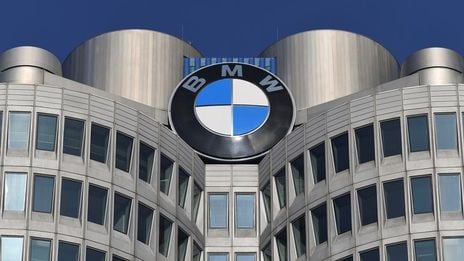(new: proposals for trucks and buses added)
STRASBOURG (dpa-AFX) - New cars with internal combustion engines should only be allowed to be sold in the EU for around twelve years, and trucks and buses should emit drastically fewer greenhouse gases by 2040. The EU Parliament approved the new CO2 requirements in Strasbourg on Tuesday, according to which only new cars that do not emit greenhouse gases during operation may be sold in the EU from 2035. Shortly afterwards, the EU Commission unveiled plans to impose significantly stricter targets on so-called heavy-duty vehicles as well.
Specifically, the plans call for a 90 percent reduction by 2040 compared to 2019, the Commission announced Tuesday. "In 2050, almost all vehicles on our roads must be emission-free," Climate Commissioner Frans Timmermans said. By 2050, the EU wants to become climate neutral - that is, only emit CO2 that can also be recaptured.
As interim targets, the Commission proposes that CO2 emissions from heavy-duty vehicles should be reduced by 45 percent by 2030 and 65 percent by 2035. In 2019, the EU had agreed for the first time to make it mandatory how much CO2 heavy-duty vehicles may emit. The EU member states and the European Parliament still have to negotiate a compromise on the proposals.
The two institutions have already come this far with the requirements for cars and vans: negotiators had already agreed on the now approved compromise in October. MEPs now formally approved the agreement, with 340 votes in favor, 279 against and 21 abstentions. The member states still have to agree, but this is considered a formality, as is the approval of the Parliament.
Socialists celebrated the agreement Tuesday as a success for more climate-friendly road transport. "The decision secures the path to conversion to cars without internal combustion engines, on which car manufacturers have long set out," said the climate policy spokesman for the SPD parliamentary group, Tiemo Wölken. At the same time, the decision will ensure that key competencies such as the production of battery cells are kept in the EU, he added.
CDU MEP Dennis Radtke criticized the decision, saying, "Greens, Liberals and Leftists voted for the combustion car ban in the EU Parliament today, even though they know they are endangering around 1.4 million jobs in Europe." FDP MEP Jan-Christoph Oetjen stressed, "The final end of the combustion engine is likely with the adoption."
The compromise is to be able to be reviewed again in 2026. There had also been prolonged disputes in the German government over the issue of the end of the internal combustion engine. Mainly Greens and Liberals held different positions. The Green-led Environment Ministry, for example, had spoken out in favor of a clear phase-out of internal combustion engines.
The compromise paper includes a request to the EU Commission to review whether so-called e-fuels could be considered for cars in the future. Oetjen spoke on Tuesday however of the fact that the commission did not give so far the appearance of bringing for it seriously a suggestion on the way.
The FDP in particular had pushed for the test request: "To achieve our climate targets, we must keep all options and technologies open," said German Transport Minister Volker Wissing (FDP) after the EU Parliament's vote. "For both the existing fleet and new vehicles, e-fuels offer climate-neutral mobility with combustion engines."
The German Association of the Automotive Industry (VDA) also believes synthetic fuels are essential to achieve ambitious climate targets. "But instead of promoting e-fuels, thinking big, Europe has so far excluded this technology and left the stock out of the equation when it comes to achieving climate targets in transport. This is out of touch with reality and is blocking our opportunities and possibilities," said VDA head Hildegard Müller.
EU Climate Commissioner Frans Timmermans sees things quite differently. The fuels should be used where they are really needed, especially in aviation, he said. "We should not use them for road transport."
For Green MEP Michael Bloss, the Commission's proposals on trucks and buses do not go far enough. Christian Democrats and Liberals apparently have no intention of changing the fact that the transport sector is a problem child, he said. "Here, too, clarity is now needed for the industry and an end date for the internal combustion engine for trucks."/rew/DP/jha











